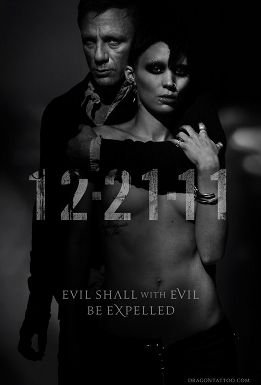David Fincher, the director behind Se7en, Zodiac and critic's darling The Social Network, returns with The Girl with the Dragon Tattoo, an American re-imagining of the overwhelmingly popular Millennium trilogy. Although it's a little disconcerting to think that one of the best creative talents in the industry is going to be spending the next several years remaking a trilogy of contemporary films, The Girl with the Dragon Tattoo is further proof that Fincher is at the top of his game.
Rooney Mara plays Lisbeth, a computer hacker and researcher who partners with Mikael (Daniel Craig) to investigate the murder of a beloved member of the wealthy Vanger family. Mara's performance is incredible and I was shocked to find that she impressed me even more than the monumental Noomi Rapace, who played Lisbeth in the Swedish trilogy. Fincher's vision of Lisbeth is even darker, more disorienting and enigmatic than before. It's Oscar-winning material. Daniel Craig turns in a great performance as well, though his role calls for a considerably more subdued presence.
Fincher's love of dark blues and various shades of black is back in full force. Stockholm has never looked so dark. The visual flair he brings to the mystery is a welcome touch as is Trent Reznor's phenomenal score. The opening credits, which feature a spectacular, dark James Bond-esque animated sequence, sport that killer Karen O cover that you'll recognize from the trailer as well.
The violence and sexual content are even more repulsive than in the Swedish version, which is really saying something. The scenes with Lisbeth and her guardian are deeply unsettling, filled with slow-motion camera work, nauseatingly skewed angles and brooding music. It's worth mentioning that, unless you know what's coming, this is NOT a movie that you're going to want to run out with a bunch of friends to see on a Friday night.
The only major flaw is the ending. It's not good in the book, it's not good in the Swedish film, and it's not good here. There's too much falling action, too much going on after the unbearably intense climax that keeps it from being as memorable as it should be. Here, the ending is considerably different from the original and makes a weak attempt to humanize the otherwise impregnable Lisbeth. As a result, the final scene feels ludicrously out of place. It's a wonder that the thing didn't end up on the cutting room floor.
Ending gripes aside, the movie is an instant classic for anyone interested in a dark mystery/thriller and it's better than the Swedish original. Mara has done it "¦ and Fincher has done it again.

